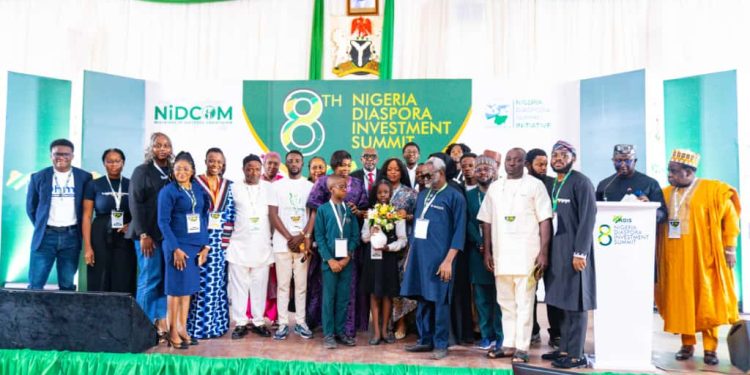By Nkechi Eze
Nigeria’s drive for economic transformation received renewed vigour on Thursday as Vice President Kashim Shettima, lawmakers, and key stakeholders called for deeper engagement of Nigerians in the diaspora to accelerate national progress through innovation, investment, and collaboration. The call was made at the opening of the 8th Nigeria Diaspora Investment Summit (NDIS) in Abuja, which brought together investors, policymakers, and development partners under the theme “Fast-Tracking Regional and National Development by Mobilising Diaspora Investment.”
In an official statement signed by Abdur-Rahman Balogun, Director of Media, Public Relations and Protocols at the Nigerians in Diaspora Commission (NiDCOM), Vice President Shettima, who was represented by the Permanent Secretary, Ministry of Foreign Affairs, Ambassador Dunoma Umar Ahmed, commended NiDCOM under the leadership of Hon. Abike Dabiri-Erewa and the Nigeria Diaspora Summit Initiative (NDSI) for their consistent efforts in mobilising diaspora investments aligned with the Federal Government’s Renewed Hope Agenda.
Shettima noted that the summit’s theme perfectly aligns with President Bola Ahmed Tinubu’s economic reform vision aimed at building a prosperous Nigeria driven by innovation and the collective strength of citizens both at home and abroad.
The Vice President reaffirmed government’s determination to create a conducive investment environment through strategic reforms and initiatives such as the Home and Abroad Housing Platform, the proposed Diaspora Bond, the ₦75 billion MSME Intervention Fund, and the FGN–ALAT Digital Skillnovation Programme. He further highlighted massive infrastructure projects valued at over ₦4 trillion spanning roads, bridges, power, and digital connectivity as tangible proof of the administration’s commitment to growth.
Calling on Nigerians in the diaspora to “return home not only physically but economically,” the Vice President urged them to channel their expertise and capital into sectors capable of driving transformation and creating jobs.
In his goodwill remarks, Senator Aniekan Bassey, Chairman of the Senate Committee on Diaspora and NGOs—represented by his Deputy, Senator Anthony Siyako Yaro—hailed diaspora investments as critical levers for national progress. He emphasised that the Nigerian diaspora community has the potential to bridge funding gaps, unlock new markets, and stimulate innovation across vital sectors.
Bassey proposed the creation of a Diaspora Bank and Investment Trust Fund to mobilise diaspora savings, provide loans, and support entrepreneurship, particularly in healthcare, education, infrastructure, and technology. He also lauded NiDCOM’s establishment of State Diaspora Focal Point Officers (SDFPOs), describing it as a model already delivering positive results nationwide.
He assured that the National Assembly would continue to provide legislative backing to strengthen diaspora participation through key bills such as the Social Development Amendment Bill, the Company and Allied Matters Amendment Bill, and the National Association of Chartered Evaluators Bill.
In her keynote address, NiDCOM Chairman and Chief Executive Officer, Hon. Abike Dabiri-Erewa, described the summit as more than a conference, calling it “a movement of purpose uniting investors, innovators, and policymakers in shaping a forward-looking Nigeria.”
She highlighted that with over 17 million Nigerians in the diaspora contributing an estimated GDP of over one trillion dollars, the diaspora remains one of the country’s greatest assets for transformation. Dabiri-Erewa noted that while remittances surpassed $25 billion in 2024, there was an urgent need to convert such inflows into structured, high-impact investments that stimulate inclusive development.
She outlined priority sectors such as infrastructure, renewable energy, healthcare, education, and technology, where diaspora investors can play catalytic roles. However, she also pointed out challenges such as regulatory bottlenecks and limited access to finance, urging government and the private sector to create stronger institutional frameworks and a more enabling business environment.
In her goodwill message, Ms. Sharon Dimanche, Chief of Mission of the International Organization for Migration (IOM), commended Nigeria’s progress in institutionalising diaspora engagement through data-driven policies and partnerships. She cited IOM’s collaboration with NiDCOM and state governments under the EU-funded Support to Migration Governance Programme, which focuses on diaspora mapping and investment partnerships in Cross River, Abia, and Lagos States.
Ms. Dimanche reaffirmed IOM’s commitment to helping Nigeria translate diaspora potential into practical impact, emphasising the need to create enabling environments, diversify investment channels, and empower subnational governments to attract diaspora capital.
The summit also featured the unveiling of the Nigeria Book Project, a comprehensive compendium of information about the country by key stakeholders including the Minister of Information and National Orientation, Alhaji Mohammed Idris; Director General of Voice of Nigeria, Malam Jibril Ndace; and several lawmakers and diaspora representatives.
The 8th NDIS continues to serve as a vital bridge between home and abroad, reinforcing the central role of Nigeria’s diaspora community as an engine for innovation, investment, and sustainable development.

















